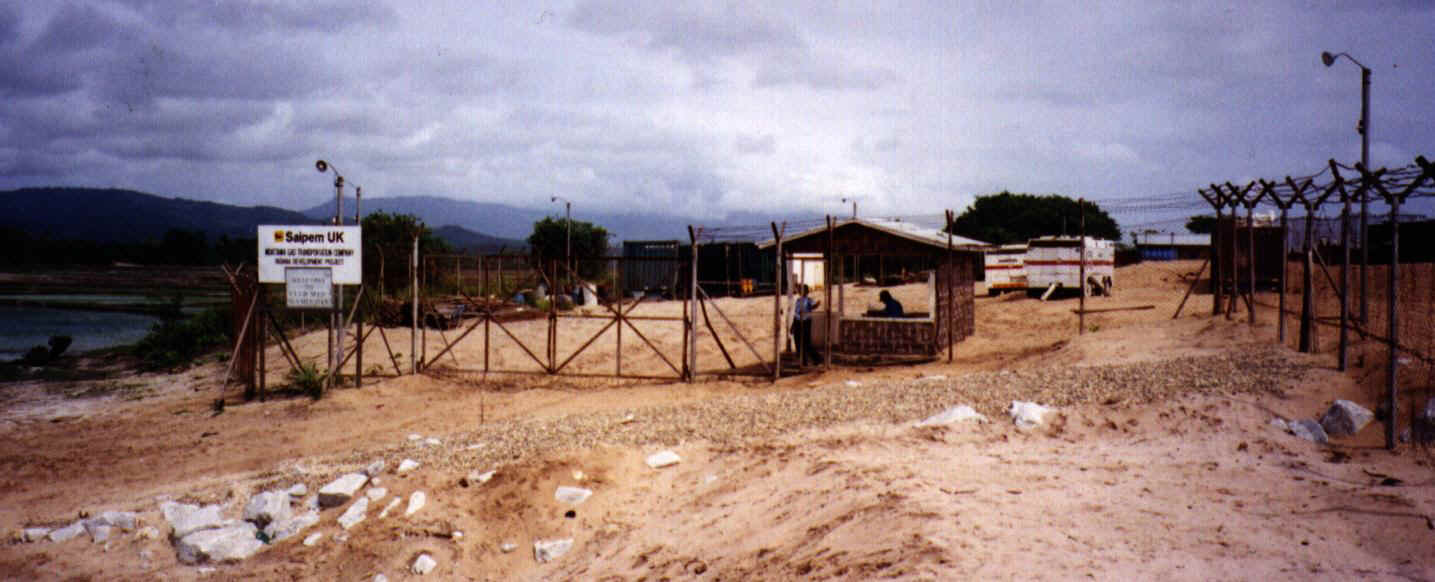
Co-editors:
Seán Mac Mathúna • John Heathcote
Consulting editor:
Themistocles Hoetis
Field Correspondent:
Allen Hougland
Article from August
Update Page . . . its relevance becomes even more apparent if you read
on. . .
Executive Order 13303
A Presidential directive, known
as Executive Order 13303 (which can be downloaded as a PDF from this
page or here)
was slipped out by the Bush Regime on May 22nd.
It has been little remarked on in the British press, but its effect will
be a further undermining of international law by the US administration and
their corporate masters. The Executive Order effectively grants immunity
to all US corporations involved in the oil business in Iraq, for any civil
or criminal cases which may be bought against them. This means, as pointed
out in a small Guardian
article of August 15th 2003, that
Corporate oil security workers
who shoot Iraqis in the course of their working day would be immune from
prosecution. If a tanker sinks or a refinery explodes, the company will
be immune from judgment, as indeed would a firm that decided to employ slave
labour to build a pipeline, or catastrophically polluted the environment.
"13303 cancels the concept of corporate accountability and abandons the
rule of [domestic and international] law," explains a paper by Tom Devine,
director of US Democratic legal thinktank Government Accountability Project.
"[It] is a blank cheque for corporate anarchy."
Other links on this subject from RECLAIM
DEMOCRACY and TOM
PAINE and Campaign
for Labor Rights
Boycott Coca-Cola!
A worldwide boycott of the
sugared-water fizzy drink, Coca-Cola (no relation to the infinitely tastier
Mecca Cola) has been launched by trade unions after a suit was launched
in 2001 against the company and their bottling plants in Columbia .
It is alleged that the bottling
plants have been responsible for hiring fascist 'militia' groups in the
country to terrorise union activists, and also solicited the assassination
of at least nine union leaders over the last 13 years. The Columbian Trade
Union, Sinaltrainal alleges that the companies "contracted with or
otherwise directed paramilitary security forces that utilised extreme violence
and murdered, tortured, unlawfully detained or otherwise silenced trade
union leaders.' Coca-Cola's name was removed from the writ by the US judge
in March, but the case against the bottling companies was allowed to continue.
No- one in Columbia has ever
been detained in relation to the murders, despite blatant threats being
issued prior to assassinations (the managers of a plant in Carepaapparently
directing paramilitaries to kill two union leaders, one of whom was later
shot at the factory). The most recently reported case was in August 2003,
in the city of Barranquilla on the Caribbean coast. Adolfo Munera, a union
activist who was recently cleared of criminal charges dating from 1997 brought
by the city's bottling plant, was murdered one week after the Columbian
High Court had insisted the plant re-employ him.
The International Confederation
of Trade Unions reported that of the 213 union deaths last year, 184 were
in Columbia.
Coca
Cola Boycott Declaration / Columbia
Solidarity Campaign / the
case
More Blood for Oil profits

Saipem Base Camp Da Min Seik
12 Burmese workers have
taken the US oil giant Unocal
to court in Los Angeles, alleging that they were terrorised by rape
and murder by the military government to become 'indentured labour', and
their land was subject to 'environmental degradation' to clear a path for
the Yadana Project, a Unocal / Total pipeline. American civil rights groups
Earth Rights International , the Centre
for Constitutional Rights and the International Labour Rights Fund,
have supported the Burmese claimants, who are remaining anonymous for fear
of Burmese Government reprisals. A Guardian
article on July 28th 2003 perhaps demonstrated why Bush was so keen
to sign Executive Order 13303 granting immunity
in Iraq to US corporations;
The action is being brought
under an old law, the Alien Tort Claims Act, passed in 1789, the scope of
which is in dispute. The US justice department hast intervened in support
of Unocal, arguing that the act should not apply. The attorney general,
John Ashcroft, had been lobbied by trade groups anxious to avoid the possibility
of being sued as a result of their foreign operations. The department argues
that the case could adversely affect the US "war on terrorism" by alienating
its allies. . .
Paul Hoffman, a member
of the plaintiffs' legal team, said the judges were aware of its significance.
"They realise that this is an incredibly important decision, because it
is really the first major case involving the Alien Tort Claims Act and corporate
responsibility and they know they are going to be setting a standard for
the country. They probably also know that the US supreme court is more than
likely to take the case."
Other oil corporations facing
potentially damaging lawsuits are Exxon Mobil operations in Indonesia; Texaco,
for its 'business' activities in Ecuador and Royal Dutch Petroleum, who
encouraged the Nigerian Government's repression of minority peoples, including
the execution of Ken Saro-Wiwa; and Exxon Mobil for its operations in Indonesia.
Earthrights
on EO 13303 / Earthrights
on Burma /corporate responsibility
database /Global
Unions ; Companies linked with Burma

